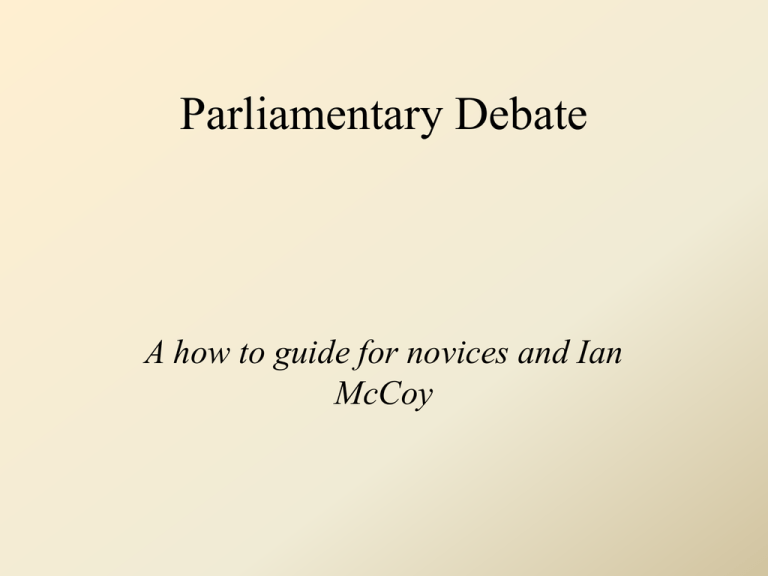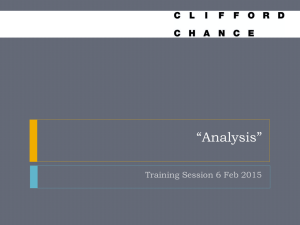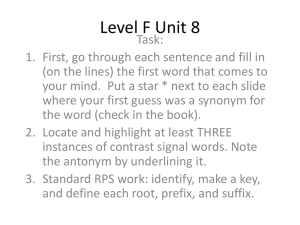Parliamentary Debate
advertisement

Parliamentary Debate A how to guide for novices and Ian McCoy FAQ’s • What is Parli? – Parli is a spontaneous team debate format modeled after the British House of Commons. Parli is a relatively new event in High School forensics, but it is popular among college debate teams. FAQ’s • Is it just like LD or Policy? – Yes & No. Parli debate does follow some of the standard debate rules and guidelines. Unlike LD and Policy, Parli can be either a value debate or a policy debate. The main difference is that the emphasis in Parli is on strong speaking skill and the creation of logical arguments. Not evidence like the other two debate forms. FAQ’s • Who can do Parli? – Anyone can compete in Parli and the event is good practice for someone curious about debate, but doesn’t have the time needed to prepare for LD or policy. The people who tend to have the most success in the event are those who like spontaneous speaking events. How Parli Works • In a Parli round a topic will be announced 15-20 prior to the beginning of the round. • Each team will be designated as either the government or the opposition. • Once the topic has been read the team will separate and prepare their case for the round. How Parli Works Speaking Time and Order • Government – (1)PM Const. 7 min – (3)MG Const. 7min – (6)PM Rebuttal 5min • Opposition – (2)LO Const. 7min – (4)MO Const. 7min – (5)LO Rebuttal 5min ***Pls note that the OPP speaks for 12 unopposed minutes. How Parli Works Who Does What? • Government – PM: The PM has several jobs in the first constructive. • Define the Resolution • Establish the elements of the plan • State the Plan • Provide a weighing mechanism for the round. • Opposition – LO: The Leader of the opp, also has several jobs in their first speech. • Attack the definitions • Attack the plan • Propose a counter plan (optional) • Provide an alternate weighing mechanism How Parli Works Who Does What? • Gov – The MG in the second constructive must: • Uphold the PM’s definitions & Attack the Opp’s def. • Defend plan and attack counter plan • Provide new examples\reasons to support the Gov. • Repeat key voting issues. • OPP – The MO in the 2nd constructive must: • Uphold the LO’s definitions & Attack the Aff’s def. • Defend plan and attack counter plan • Provide new examples\reasons to support the OPP. • Repeat key voting issues. How Parli Works Who Does What? • Gov – The PM in the final rebuttal should: • Address any new arguments brought up by the Opp • Tell the story of why we won. • Opp – The LO in the final rebuttal should: • Attack the Gov’s plan • Restate the Opp’s plan • The the story of why they won. How Parli Works Who Does What? • Parli debate does not have a specific time set aside for cross examination. Instead the students are allowed to ask questions of the speaker with the exception of the first and last minute of each speech. • Whoever is not speaking next should be asking as many questions as they can get away with, during their opponents speech. How do I win? • To win Parli, you must first understand an important rule: – The government has a burden that they must meet. Since the government is advocating a change in the status quo, they must prove that their change will improve the status quo. This is why the plan is critically important in the government’s case. How do I win? • The Opposition is fortunate in that they do not have to meet any burden. The Opp can win in a variety of ways: – Prove that the gov’s plan will not work – Prove that the gov’s problem is not important – Provide a better counter plan What is a plan? • A plan is just your way of solving a problem. If you have ever competed in congress, then you know exactly what a plan is (hint: it is the bill you are debating). For a plan to work there are several essential elements that you need. Essentials of the Plan • Inherency: Otherwise known as the problem. Before you can come up with a plan you must define the problem that your plan fixes. For a plan to be successful you problem must be two things: – Serious: if no one cares it is not a good problem. – Ongoing: If the problem has already happened and will not happen again, then it is not good. Essentials of the Plan • Harms: Why do we care? How is this problem hurting us. Is it costing us money, lives, property, etc. This is crucial in getting your judge to buy into your plan. Essentials of the Plan • Plan: This is how you are going to solve your problem. All good plans should have the following: – Agent of Action: who is going to implement the plan – Funding: How much is it going to cost? How are we going to pay for it? – You solution: What is being done. Essentials of the Plan • Solvency: Prove how your plan will solve the problems you listed. It is not good enough to just say it will, you must prove it is true. Normally you should go through you Inherency and address each problem individually.








